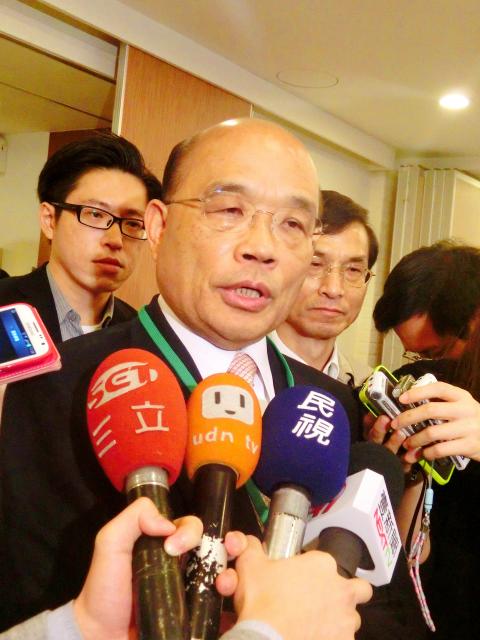Democratic Progressive Party (DPP) Chairman Su Tseng-chang (蘇貞昌) yesterday condemned controversial remarks Shih Hsin University professor Wang Hsiao-po (王曉波) made regarding the 228 Massacre and said Wang has added insult to injury for families whose loved ones were killed in the tragedy.
Wang, who was also the convener of the Ministry of Education’s controversial curriculum adjustment task force, said on Friday that the killing of 20,000 people by former president Chiang Kai-shek’s (蔣介石) Nationalist military in the 228 Massacre was “a small case” compared with the 400,000 killed during Chiang’s purges in China.
“Everybody is born as a mother’s child. When a person does not respect life, but only uses death tolls to measure how big a historical tragedy was, how then are we to conduct a dialogue with a person like this?” Su said yesterday.

Photo: Lee Hsin-fang, Taipei Times
“People should impose sanctions against such remarks, which add insult to injury, or a government that allows people to make such remarks unscrupulously,” he added.
Separately yesterday, Taiwan 228 Care Association Chairman Chen Yi-shen (陳儀深) also criticized Wang’s remarks, saying that he should be condemned for talking about the 228 Massacre from the perspective of China’s history, a stance that entirely disregards Taiwanese, who suffered under arbitrary arrests and killing sprees during the tragedy.
According to Wang, Chiang started killing his opponents in China, not in Taiwan, adding that the Chinese government estimated Chiang had put to death more than 400,000 people during the “communist purges” in China in the 1920s.
“Families of Taiwan’s 228 [Massacre] victims said the total [number of] people killed by the KMT troops was about 20,000. So when you compare 400,000 with 20,000, what we have here is a small case,” Wang said, adding that the 228 Incident was not a conflict between Taiwanese and Mainlanders, but of oppressed people rising up against oppressors.
In response, Wang yesterday said his remarks had been taken out of context.
Wang said he made the remarks mainly to emphasize that the 228 Massacre was a conflict between oppressed people and their oppressors.
At the time of the massacre there were separate mass uprisings in 13 provinces in China, he said, adding that it suggested that people stood in conflict with their governments over issues of corruption, not ethnicity.
Wang also rebutted allegations that he was siding with Chiang’s actions.
He said that by pointing out that Chiang killed 400,000 people in China, in addition to what in comparison was “a small case” of 20,000 people killed in the 228 Massacre, he was in fact speaking on behalf of the Taiwanese victims, who added more sins to those which Chiang had committed.
“Chiang killed my mother and jailed my father, I am the one who abominates him most,” Wang said.
Wang’s mother was executed by the Chinese Nationalist Party (KMT) during the White Terror era on charges of sedition.
Additional reporting by Tseng Wei-chen

SECURITY: As China is ‘reshaping’ Hong Kong’s population, Taiwan must raise the eligibility threshold for applications from Hong Kongers, Chiu Chui-cheng said When Hong Kong and Macau citizens apply for residency in Taiwan, it would be under a new category that includes a “national security observation period,” Mainland Affairs Council (MAC) Minister Chiu Chui-cheng (邱垂正) said yesterday. President William Lai (賴清德) on March 13 announced 17 strategies to counter China’s aggression toward Taiwan, including incorporating national security considerations into the review process for residency applications from Hong Kong and Macau citizens. The situation in Hong Kong is constantly changing, Chiu said to media yesterday on the sidelines of the Taipei Technology Run hosted by the Taipei Neihu Technology Park Development Association. With

CARROT AND STICK: While unrelenting in its military threats, China attracted nearly 40,000 Taiwanese to over 400 business events last year Nearly 40,000 Taiwanese last year joined industry events in China, such as conferences and trade fairs, supported by the Chinese government, a study showed yesterday, as Beijing ramps up a charm offensive toward Taipei alongside military pressure. China has long taken a carrot-and-stick approach to Taiwan, threatening it with the prospect of military action while reaching out to those it believes are amenable to Beijing’s point of view. Taiwanese security officials are wary of what they see as Beijing’s influence campaigns to sway public opinion after Taipei and Beijing gradually resumed travel links halted by the COVID-19 pandemic, but the scale of

A US Marine Corps regiment equipped with Naval Strike Missiles (NSM) is set to participate in the upcoming Balikatan 25 exercise in the Luzon Strait, marking the system’s first-ever deployment in the Philippines. US and Philippine officials have separately confirmed that the Navy Marine Expeditionary Ship Interdiction System (NMESIS) — the mobile launch platform for the Naval Strike Missile — would take part in the joint exercise. The missiles are being deployed to “a strategic first island chain chokepoint” in the waters between Taiwan proper and the Philippines, US-based Naval News reported. “The Luzon Strait and Bashi Channel represent a critical access

Pope Francis is be laid to rest on Saturday after lying in state for three days in St Peter’s Basilica, where the faithful are expected to flock to pay their respects to history’s first Latin American pontiff. The cardinals met yesterday in the Vatican’s synod hall to chart the next steps before a conclave begins to choose Francis’ successor, as condolences poured in from around the world. According to current norms, the conclave must begin between May 5 and 10. The cardinals set the funeral for Saturday at 10am in St Peter’s Square, to be celebrated by the dean of the College